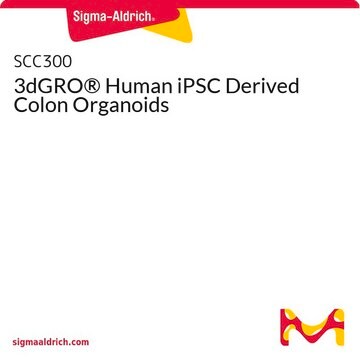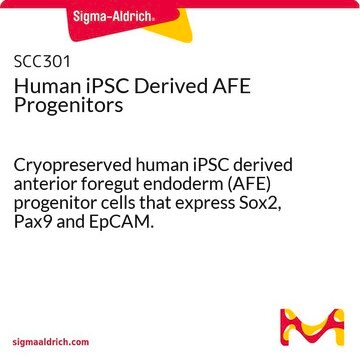SCC271
Simplicon® Human iPS Cell Line
Highly characterized integration-free human induced pluripotent stem cell (iPSC) line generated using Simplicon® RNA reprogramming technology.
Synonym(s):
Human Pluripotent Stem Cell Line, Human iPSC Line
About This Item
Recommended Products
packaging
vial of ≥1X10⁶ cells
technique(s)
cell culture | stem cell: suitable
shipped in
dry ice
storage temp.
−196°C
General description
Simplicon® RNA Reprogramming Technology is a next generation non-integrating reprogramming system that uses a single synthetic self-replicating RNA strand engineered to mimic cellular RNA to generate human iPS cells. The single RNA strand contains the four reprogramming factors, OCT-4, KLF-4, SOX-2 and GLIS1 (OKSG) and enables extremely efficient reprogramming using a single transfection step without any viral intermediates or host genome integration. TheSimplicon® human iPS cell line was generated by reprogramming human foreskin fibrobalsts (SCC058) using theSimplicon® RNA Reprogramming Kit (SCR550). The cell line is integration-free, highly characterized and maintains a pluripotent phenotype over multiple passages.
Application
Packaging
Storage and Stability
Other Notes
Legal Information
Disclaimer
Storage Class Code
12 - Non Combustible Liquids
WGK
WGK 1
Flash Point(F)
Not applicable
Flash Point(C)
Not applicable
Certificates of Analysis (COA)
Search for Certificates of Analysis (COA) by entering the products Lot/Batch Number. Lot and Batch Numbers can be found on a product’s label following the words ‘Lot’ or ‘Batch’.
Already Own This Product?
Find documentation for the products that you have recently purchased in the Document Library.
Articles
Lung organoids are valuable 3D models for human lung development and respiratory diseases. The 3dGRO™ differentiation protocol generates organoids from human iPSCs in 4 steps.
Lung organoids are valuable 3D models for human lung development and respiratory diseases. The 3dGRO™ differentiation protocol generates organoids from human iPSCs in 4 steps.
Lung organoids are valuable 3D models for human lung development and respiratory diseases. The 3dGRO™ differentiation protocol generates organoids from human iPSCs in 4 steps.
Lung organoids are valuable 3D models for human lung development and respiratory diseases. The 3dGRO™ differentiation protocol generates organoids from human iPSCs in 4 steps.
Protocols
Step-by-step stem cell culture protocols for human induced pluripotent stem cells (iPSCs) including ips cell thawing, expanding, freezing and characterizing.
Step-by-step stem cell culture protocols for human induced pluripotent stem cells (iPSCs) including ips cell thawing, expanding, freezing and characterizing.
Step-by-step stem cell culture protocols for human induced pluripotent stem cells (iPSCs) including ips cell thawing, expanding, freezing and characterizing.
Step-by-step stem cell culture protocols for human induced pluripotent stem cells (iPSCs) including ips cell thawing, expanding, freezing and characterizing.
Our team of scientists has experience in all areas of research including Life Science, Material Science, Chemical Synthesis, Chromatography, Analytical and many others.
Contact Technical Service







